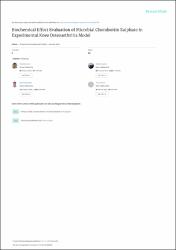| dc.contributor.author | Erenler, Ayse Şebnem | |
| dc.contributor.author | Bay Karabulut, Aysun | |
| dc.contributor.author | Sevimli, Resit | |
| dc.contributor.author | Geçkil, Hikmet | |
| dc.contributor.author | Akpolat, Nusret | |
| dc.contributor.author | Ünver, Tuba | |
| dc.contributor.author | Otlu, Önder | |
| dc.date.accessioned | 2022-03-10T10:46:08Z | |
| dc.date.available | 2022-03-10T10:46:08Z | |
| dc.date.issued | 2022 | en_US |
| dc.identifier.citation | Erenler, A. S., Karabulut, A. B., Sevimli, R., Geckil, H., Akpolat, N., Unver, T., & Otlu, O. (2022). BIOCHEMICAL EFFECT EVALUATION OF MICROBIAL CHONDROITIN SULPHATE IN EXPERIMENTAL KNEE OSTEOARTHRITIS MODEL. FRESENIUS ENVIRONMENTAL BULLETIN, 31(1), 510-+. | en_US |
| dc.identifier.uri | https://hdl.handle.net/20.500.12899/582 | |
| dc.description.abstract | Osteoarthritis (OA) is the most commonchronic joint disease, primarily due to aging.Chondroitin sulfate (CS) is a glycosaminoglycan(GAG) commonly used to treat osteoarthritis. CS candelay the progression of pathology or reversemorphological changes in joint structure.Traditionally CS is produced from animal sources.However, due to different reasons such ascontamination, ecological risA, and the possibility ofinfectious diseases, the trend towards microbialsources has increased because of its advantages suchas purer, more antiallergic, and lower MolecularWeight (MW) than animal sources. Biochemicalanalysis of Microbial CS (MCS), which is a new andsignificant alternative as a source of CS in the OAhealing process, has not been evaluated in theliterature yet. This study was designed to analyze thebiochemical effects of MCS produced by our teamfrom a microbial source, with an MW value of 269Daltons, on the osteoarthritis healing processcompared to the commercial form. We aim to reachdata that MCS has a higher antioxidant effect thananimalYsourced CS, and in this way, it is a moresuitable production for the treatment ofosteoarthritis. In this study, Anee osteoarthritis wassurgically induced in experimental rabbits; and TGFY1β, CAT, MPO, TOS, and OSI parameters measuredin blood samples before the operation and after thehealing period were analyzed comparatively. Afterthe surgical application, the rabbits were randomlydivided into three groups: control, animalYsourcedCS, and E. coli sourced MCS. The standard rabbitdiet was administered daily to 10 rabbits in Group 1(control), and CS and MCS were applied daily to theother groups as 17 mg/Ag for 12 weeAs. Bloodsamples were taAen from rabbits at the 12th weeAafter surgery, and TGFY1β, CAT, MPO, TOS, andOSI parameters were biochemically evaluated. Thisstudy has confirmed that the antioxidant propertiesof MCS and data on its effectiveness in controllingoxidative stress compared to animalYsourced CS.Based on these results, it can be concluded that MCShas a significant potency of nutraceutical andtherapeutic agents for OA treatment. | en_US |
| dc.language.iso | en | en_US |
| dc.publisher | Erenler, Ayse Sebnem; Karabulut, Aysun Bay; Otlu, Onder | en_US |
| dc.relation.ispartof | FRESENIUS ENVIRONMENTAL BULLETIN | en_US |
| dc.rights | info:eu-repo/semantics/closedAccess | en_US |
| dc.subject | chondroitin sulphate | en_US |
| dc.subject | microbial chondroitin sulphate | en_US |
| dc.subject | osteoarthritis | en_US |
| dc.title | Biochemical effect evaluation of microbial chondroitin sulphate in experimental knee osteoarthritis model | en_US |
| dc.type | Article | en_US |
| dc.authorid | 0000-0002-1786-5022 | en_US |
| dc.authorid | 0000-0002-7873-2805 | en_US |
| dc.authorid | 0000-0001-5958-7609 | en_US |
| dc.department | MTÖ Üniversitesi, Tıp Fakültesi, Temel Tıp Bilimleri Bölümü | en_US |
| dc.institutionauthor | Erenler, Ayse Şebnem | |
| dc.institutionauthor | Bay Karabulut, Aysun | |
| dc.institutionauthor | Otlu, Onder | |
| dc.identifier.volume | 31 | en_US |
| dc.identifier.issue | 1 | en_US |
| dc.identifier.startpage | 510 | en_US |
| dc.identifier.endpage | 517 | en_US |
| dc.relation.publicationcategory | Makale - Uluslararası Hakemli Dergi - Kurum Öğretim Elemanı | en_US |


















